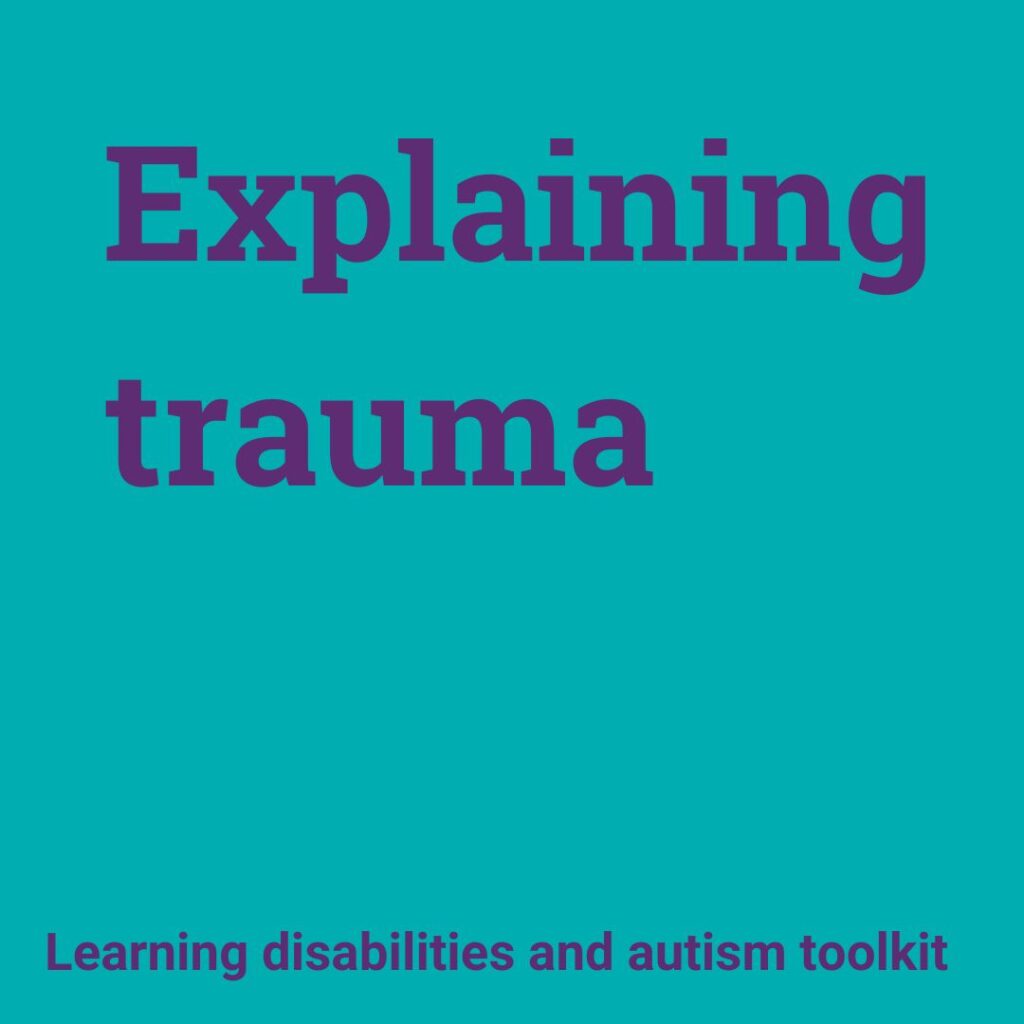
Explaining trauma
Trauma is a lasting emotional response that can occur following a frightening or harmful experience. Experiencing a traumatic event can cause strong physical, emotional and behavioural reactions. This can include depression, low self-esteem, self-blame and guilt
Understanding what trauma is and how to recognise the signs is important if you are supporting someone who has experienced sexual violence.
Experiencing trauma symptoms can be particularly unsettling and confusing for an autistic person or a person with learning disabilities who may not be able to communicate or understand why these reactions are happening or whether they will happen again. Having an awareness of the impact of trauma can provide an understanding of what the person may be feeling and experiencing.
How the brain reacts to trauma
The human brain is rational and intuitive. When you are exposed to danger or traumatic events, the intuitive side takes over. It does what it needs to do to survive. The brain has five instinctive reactions:
• Fight (running from the situation)
• Flight (aggression)
• Freeze (unable to move)
• Flop (not able to hold our bodies)
• (Be) friend (make friends with the perpetrator).
Your brain will choose the reaction that is most likely to lead to survival and the least harm. It doesn’t think about how you will feel after. The person will not be aware of the decision-making process, it is unconscious. During rape or abuse, the first two options often aren’t possible. They may lead to further physical or mental harm from the abuser. The last three options are very common as they expose the survivor to the least danger.
If there is a safe outcome (survival), the brain will learn to use that reaction again. This means that even after the traumatic event is over, the brain will continue to use this response repeatedly in less and less risky situations. This can lead to a heightened state of awareness of risk, anxiety, or feelings of numbness.
Watch our video on trauma and the brain
Recognising Trauma
It is common for victim-survivors of sexual violence to experience flashbacks, nightmares, fearfulness, panic and wanting to avoid people and places. This can result in relationship difficulties, self-harm, depression and even suicide.
The impact of the trauma may be felt immediately after someone experiences a distressing event, or it can occur weeks, months or even years later. It is important to support people to understand that what they are feeling and experiencing is a normal reaction to what they have experienced.
Common signs of trauma can include but are not limited to:
| Physical signs | Behavioural signs | Emotional signs |
|---|---|---|
| Problems sleeping | Changes in eating | Feeling of guilt/shame |
| Tiredness | Neglecting personal hygiene | Panic attacks |
| Sweating | Increased or excessive smoking, drinking, drug use | Nightmares |
| Headaches | Not wanting to go out | Anger |
| Racing heart | Irritability | |
| Tight chest | Loss of confidence | |
| Reflux, diarrhea | Flashbacks |
Signs of trauma in autistic people and people with learning disabilities
As well as being aware of the common signs of trauma, if you are supporting an autistic person or a person with learning disabilities, you should look out for changes in everyday actions and behaviours. This may be particularly important if the person is unable to verbally communicate their feelings and emotions.
Sometimes professionals may use terms like ‘challenging behaviours’ or ‘off baseline’ to describe increased anger, aggression and self- injurious behaviours. If these behaviours are increasing, they should receive further attention to understand what the person is experiencing and what is triggering this behaviour.
What is a trigger?
A trigger is anything that reminds someone of a traumatic event. Anything can be a trigger – smells, sounds, words, places or images. Triggers can be really unique to the individual.
If a victim-survivor of sexual violence is triggered, they can be re-traumatised or feel as though they are reliving the traumatic event. The person may not be able to identify or communicate what triggers their trauma response. They may need support to find the right coping strategies to deal with these overwhelming and frightening sensations.
How to provide support
- Support the person to understand and recognise triggers. This could be thinking about sounds, smells, places, people, certain time of the day or times of the year that remind them of what they have experienced. You could support them to keep a diary or a record of when this has happened, as a way of identifying the triggers.
- Make a trigger plan. Support the person to think about: when am I triggered or stressed, what can I do when I feel like that and what can I do to make myself feel better? You could consider making a chart or using pictures and symbols as a visual planner.
- Support the person to look at grounding techniques. Grounding techniques are simple things that you can do to become aware of the present and your surroundings. This can include things such as breathing techniques, putting on some music, stroking a pet.
- Support the person to think about things that make them happy, activities they like doing, things that make them feel good. This could be taking a walk in the fresh air, having a warm bath or eating something comforting. Support them to make a list or make a picture or collage of these things.
- People may need support to recognise and understand the emotions they are feeling. Autistic people may find it very difficult to verbalise how they are feeling and become quickly overwhelmed. It might be useful to use tools such as an emotions wheel to help them identify how they are feeling.
Useful resources
Useful information
The latest from our news and blogs

When convenience becomes control: understanding technology-facilitated abuse in smart homes
Smart home devices are designed to make life easier: lights that switch on with your voice, a camera that tells you who’s at the door, and heating you can adjust from your phone.












